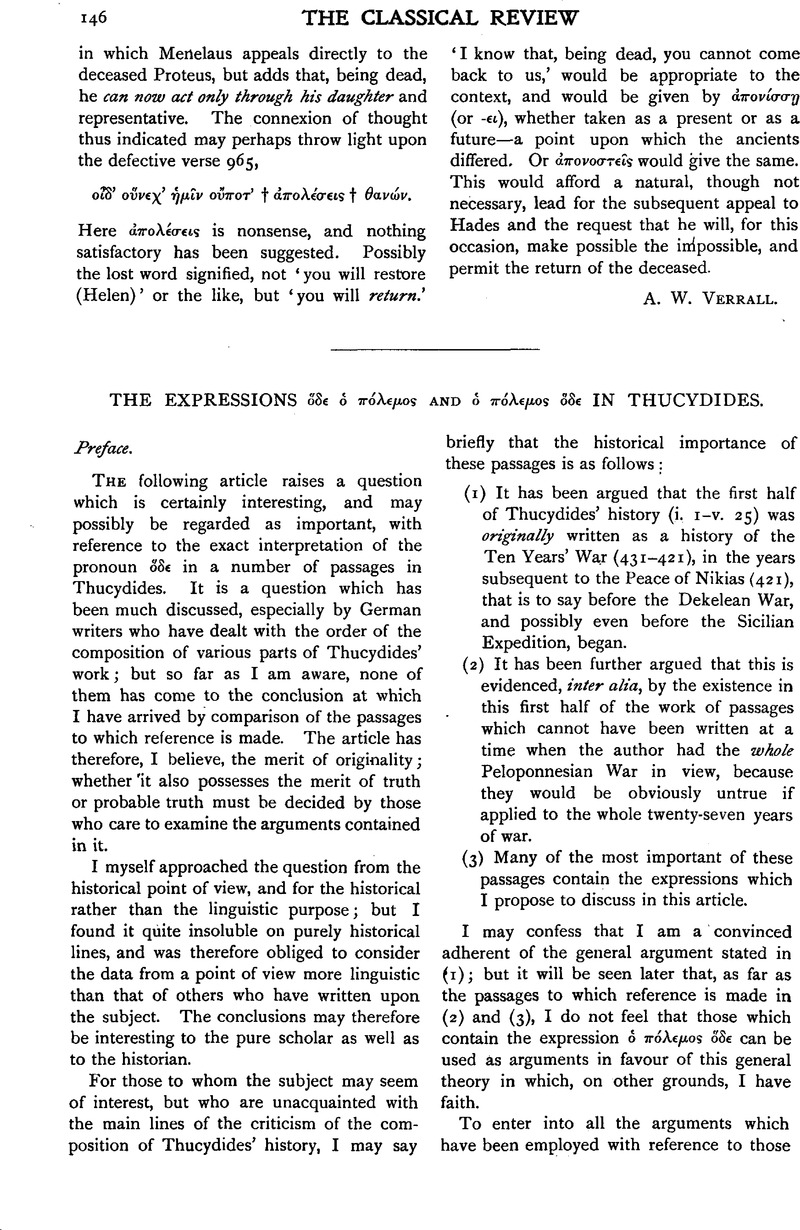No CrossRef data available.
Article contents
The Expressions ὅδε ὁ πóλεμος and ὁ πóλεμος ὅδε in Thucydides
Published online by Cambridge University Press: 27 October 2009
Abstract

- Type
- Original Contributions
- Information
- Copyright
- Copyright © The Classical Association 1909
References
page 147 note 1 i. 23 (preceding); i. 21 and vii. 85 (following).
page 147 note 2 Cases in which it precedes are found: i. 8, 13, 18, 23, 24, 97, 118 (3 times); ii. 16, 21, 34; vi. 17; vii. 44, 56. Cases in which it follows are found: ii. 47, 70, 103; iii. 25, 54, 88, 98, 113, 116; iv. 48, 51, 133, 135; v. 20 (twice); vi. 7, 93; vii. 18; viii. 6, 60, 87.
page 147 note 3 ![]() .
.
page 147 note 4 I have called attention to this contrast between the frequency of the use ὅδε and the rarity of the use of οὗτος because it is so striking a peculiarity in the author's composition. But I have not made up my mind as to what conclusion is to be drawn therefrom. I cannot believe that it is simply due to a mere personal preference for the one form of the distinguishing adjective over the other, because, in point of fact, οὗτος is far more common than ὅδε in the general text of Thucydides. I believe it to be deliberate in a significant sense, but I confess I am unable to make any satisfactory suggestion as to where the significance lies. One negative fact is certain: that the common distinction between οὗτος as referring to previous and ὅδε as referring to subsequent matter, though marked in other parts of Thucydides, does not hold good in these phrases.
page 148 note 1 As in ii. 47, 70, 103; iii. 25, 88, 116; iv. 51, 135.
page 148 note 2 As in iii. 54, 98, 113; iv. 48; v. 20(twice).
page 148 note 3 vi. 7, 93; vii. 18; viii. 6, 60.
page 148 note 4 vii. 87.
page 148 note 5 vi. 17; vii. 44, 56.
page 148 note 6 ii. 103; iii. 25, 88, 116; iv. 51, 135; vi. 93; vii. 18; viii. 6, 60.
page 148 note 7 ii. 70; vi. 7.
page 148 note 8 ii. 47.
page 148 note 9 iv. 116; v. 39, 51, 56, 81, 83.
page 148 note 10 Viz., those in Book V.
page 148 note 11 iv. 116.
page 148 note 12 iv. 116.
page 149 note 1 The passage is: ![]() … Here το⋯δε must almost certainly refer to the Ten Years' War, because, as Ullrich points out, the passage is written in obvious ignorance of the fact that the taking of Athens and the decision of the Dekeleian War was finally brought about by long continued starvation. The Dekeleian War, too, -was another Dorian War.
… Here το⋯δε must almost certainly refer to the Ten Years' War, because, as Ullrich points out, the passage is written in obvious ignorance of the fact that the taking of Athens and the decision of the Dekeleian War was finally brought about by long continued starvation. The Dekeleian War, too, -was another Dorian War.
page 149 note 2 This conclusion is important, because in passages in which ὅδε succeeds nouns other than π⋯λεμος, the existence, at the time of speaking, of that which is referred to by ὅδε is a marked peculiarity of most of the passages.
page 153 note 1 Herbst, Philologus, 38, takes this view of the meaning.
page 153 note 2 E.g., Herbst, Philologus, 38.
page 153 note 3 Cf. ii. 2.
page 153 note 4 Philologus, 38.
page 153 note 5 In 374 B.C. Cf. Diodoros, xv. 46 and 47, and Xen. Hell. v. 2. 4–38.
page 153 note 6 xiii. 48.




